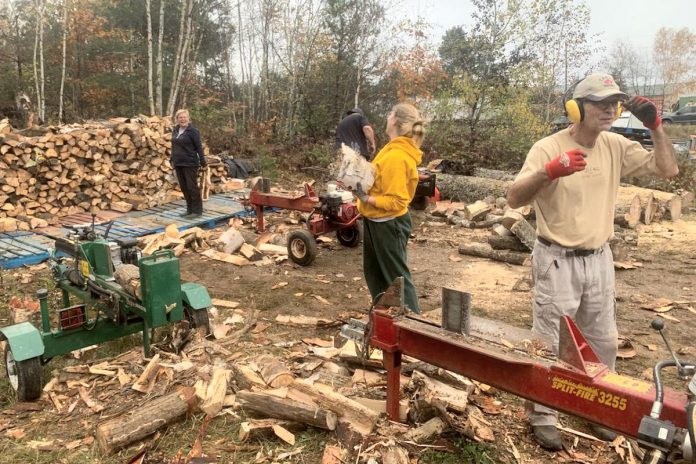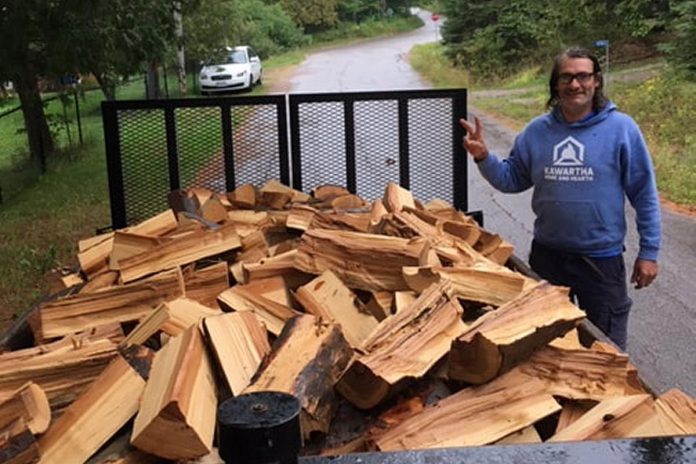
A charitable organization is striving to keep Haliburton County residents toasty in their homes amidst plummeting temperatures and rising heating costs this winter.
Over the past year, the demand for services from Heat Bank Haliburton County, a program of the Central Food Network (CFN), has grown, as the cost of living continues to increase or people incur extra costs such as for medical expenses, noted Tina Jackson, CFN’s executive director.
The mission of Heat Bank Haliburton County is to keep residents’ homes heated and to create opportunities to help those living in poverty. According to CFN, Haliburton County has one of the highest rates of energy poverty in Canada.
“For some, the added cost of filling up the oil or propane tanks or stocking the woodshed is a minor inconvenience — for others, it means heartbreaking sacrifices and juggling whether to heat or eat,” CFN noted. “Many homes in our community will not have enough money for both and will have to cut on their grocery or medication costs in order to keep their homes at minimal temperatures.”
Heat Bank Haliburton County began in 2013 as a community initiative with a mission to increase the supply of, and ease of access to, emergency firewood and heat for vulnerable residents of Haliburton County.
The bank formed when several community groups, agencies and community members recognized the need for a united front to provide support.
Jackson was one of the founders, along with A Place Called Home, Heather Reid and Abbey Gardens, Judy MacDuff and David Ogilvie and 4C’s of Haliburton, Ken Mott and Wilberforce Food Bank, Robert Spurrier and Cardiff Community Food Bank, John Teljeur and JT’s Food Crusade, and Terry Goodwin and Men of Integrity.
“We decided if we all just collectively work together …. we could build up bigger supplies,” Jackson said.

Heat Bank Haliburton County is now a registered charity operating in the Municipality of Highlands East in the Haliburton Highlands.
The reception from the community about having heat resources available, is one of “appreciation,” the executive director said.
“We do so much more than just offer fuel grants,” Jackson explained. “We will also look at people’s household income and what their circumstances are and try to figure out if there are any other services and supports available to also help them.”
For example, the heat bank received a call recently from someone whose propane tanks were getting low, and they didn’t have the cash available for a minimum fill. As Jackson spoke with them about income, hydro bills, and other matters, she was able to tell them they were eligible for a credit.
“So, in addition to a $600 fuel grant, we’re also going to help them with the paperwork to get a hydro credit. Now they’re going to be saving $45 a month off their hydro (bill), which could help them put a little bit of food in the cupboards or help them keep up with the heating costs in the future.”
The heat bank, originally an initiative of A Place Called Home, was taken on by CFN in 2016. Like a food bank, the heat bank runs solely on donations, Jackson noted.
There are firewood depots situated across Haliburton County, which allows for wood donations to be directed to an area close to its source, CFN noted.
“It also means that we are really neighbours helping neighbours, especially given the number of community members who come together to help cut and split wood and the team of volunteers who deliver it, even on the worst of winter days.”

The heat bank provides emergency firewood — small amounts of free, seasoned firewood to households that are struggling with the cost of heating their homes or find themselves in a heating emergency.
As Jackson noted, the intake process helps determine residents’ eligibility to benefit from other programs or supports.
The heat bank’s ‘Home to Home Firewood Program’ connects lower-income households who heat with wood to households that have extra hardwood. This program runs from spring through to early fall.
When it comes to oil and propane, the heat bank provides grants for emergency fuel, information, referral, and advocacy support for access to services and programs, and assistance to “identify longer-term or alternative strategies to promote the household’s autonomy.” It also provides information for low-income hydro customers and staff will advocate and negotiate directly with Hydro One.
The Heat Bank is an authorized intake agency for the Ontario Energy Board’s LEAP – Low-income Energy Assistance Program hydro arrears program and Ontario Electricity Support Program hydro credit program.
For more information about Heat Bank Haliburton County, or to make a donation, visit the website at www.heatbankhc.ca or call or send a text to 705-306-0565.


























